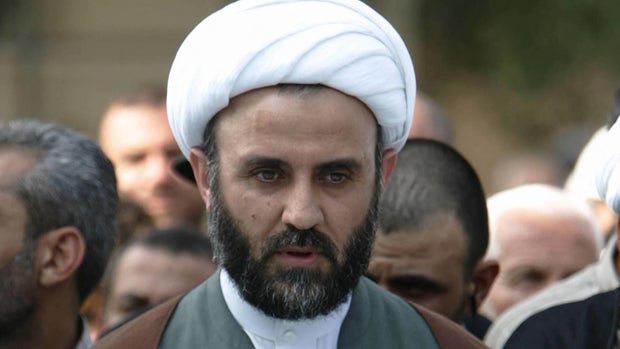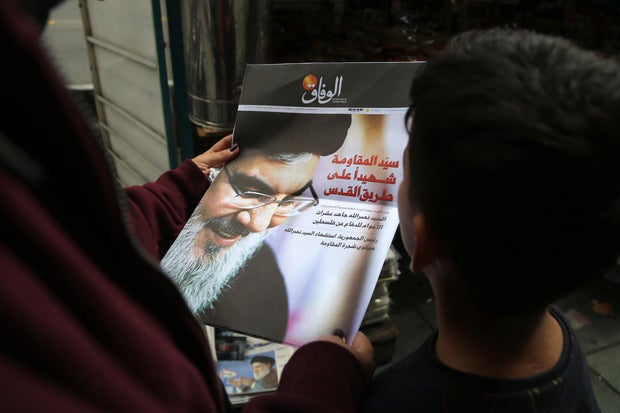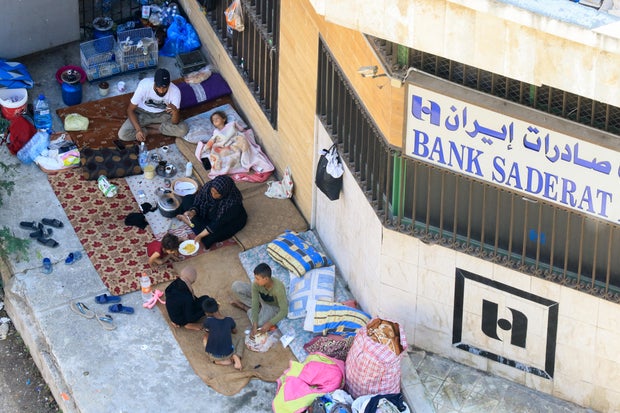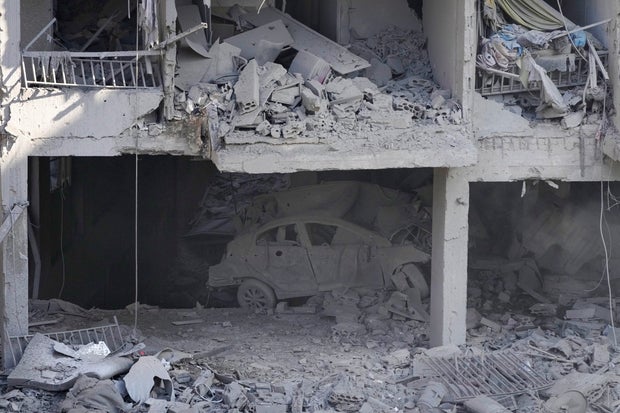CBS News
Israel says it has killed another high-ranking Hezbollah official as conflict escalates

The Israeli military said Sunday that it killed another high-ranking Hezbollah official in an airstrike as the terrorist group in Lebanon reels from a string of devastating blows and the killing of its longtime leader Hassan Nasrallah.
The Israel Defense Forces said it killed Nabil Kaouk, the deputy head of Hezbollah’s Central County, in an airstrike on Saturday. Hezbollah confirmed his death, making him the seventh senior Hezbollah leader slain in Israeli strikes in a little over a week. They include founding members who had evaded death or detention for decades.
Kaouk was a veteran member of Hezbollah going back to the 1980s and served as Hezbollah’s military commander in southern Lebanon during the 2006 war with Israel. He often appeared in local media, where he would comment on politics and security developments, and he gave eulogies at the funerals of senior militants. The United States had announced sanctions against him in 2020.
RAMZI HAIDAR/AFP via Getty Images
The announcement of Kaouk’s death came a day after the Israeli military said it killed Nasrallah in an afternoon airstrike on Friday in Beirut. The IDF said it targeted the group’s “central headquarters,” which were “embedded under a residential building” in Beirut’s southern suburbs.
On Sunday, Hezbollah confirmed that among those killed in Friday’s airstrike was also Ali Karaki, one of the group’s senior commanders.
The Iran-backed group confirmed its longtime leader “has joined his fellow martyrs.”
Several senior Hezbollah commanders have been killed in Israeli strikes in recent weeks, including founding members of the group who have evaded death or detention for decades. The U.S. designated terrorist group was also targeted by a sophisticated attack on its pages and walkie-talkies that was widely blamed on Israel.
A wave of Israeli airstrikes across large parts of Lebanon has killed more than 1,000 people – including 156 women and 87 children – in fewer than two weeks, according to Lebanon’s Health Ministry.
Hezbollah has continued to fire rockets and missiles into northern Israel, but most have been intercepted or fallen in open areas, causing few casualties and only scattered damage.
Thousands of people in shelters after strikes
A Lebanese cabinet minister spearheading the country’s emergency response said that the government estimates about 250,000 people have left their homes and taken refuge in government-run shelters and informal ones.
Fatemeh Bahrami/Anadolu via Getty Images
Environment Minister Nasser Yassin told the Associated Press that the total number is about “four times as many directly affected and/or displaced outside the shelters.”
The United Nations said that as of Friday, 211,319 people were forced to relocate, and that was before some intensive Israeli airstrikes over Beirut’s southern suburbs in recent days.
The Lebanese government has converted schools and other facilities into temporary shelters. Still, many are sleeping on the streets or in public squares, as the government and non-governmental organizations try to find them places to stay.
MAHMOUD ZAYYAT/AFP via Getty Images
Fighting escalates as airstrikes continue
Amid the escalation from Israel — who is said to be sending ground troops to the border with Lebanon for a possible limited ground incursion next week, according to a U.S. official — Lebanon’s military called for calm among the Lebanese “at this dangerous and delicate stage.”
Government officials fear that the country’s deep political divisions at a time of war could rekindle sectarian strife and violence in the small Mediterranean country.
“The Israeli enemy is working to implement its destructive plans and spread division among the Lebanese,” the military said.
Military vehicles have been deployed in different parts of the capital as thousands of displaced people continue moving from the south to Beirut.
Meanwhile, Lebanon’s state news agency said an Israeli airstrike early Sunday destroyed a home in the northeast village of al-Ain, killing 11 people. Six of the bodies were recovered from under the rubble as the search continued for the remaining five, National News Agency reported.
Hassan Ammar / AP
In southern Lebanon, the Islamic Risala Scout Association said five of its members were killed while performing their duties. It said four of the men killed were from the southern village of Tayr Debba while the fifth was from nearby Kabrikha.
Hezbollah began firing rockets, missiles and drones into northern Israel after Hamas’ Oct. 7 attack out of Gaza triggered the war there. Hezbollah and Hamas are allies that consider themselves part of an Iran-backed “Axis of Resistance” against Israel.
Israel has responded with waves of airstrikes, and the conflict has steadily ratcheted up to the brink of all-out war, raising fears of a region-wide conflagration.
A senior Israeli official said Friday that Israel was not seeking a broader regional war but that Hezbollah’s military capabilities had been meaningfully degraded by the recent series of Israeli military operations and that the objective of the strike was to leave Hezbollah with a significant leadership gap.
Israel says it is determined to return some 60,000 of its citizens to communities in the north that were evacuated nearly a year ago. Hezbollah has said it will only halt its rocket fire if there is a cease-fire in Gaza, which has proven elusive despite months of indirect negotiations between Israel and Hamas led by the United States, Qatar and Egypt.
CBS News
Will enrolling in a credit card debt management program hurt your credit?

Getty Images
With average credit card interest rates recently surpassing 23% and retail credit card rates sitting above 30% on average, many Americans have found themselves trapped in a cycle of minimum payments and mounting balances. That can be a tough road to navigate in any economic environment, but in today’s landscape, where prices on essentials continue to climb and household budgets remain stretched, it can be even more difficult to conquer. As a result, more cardholders are maxing out their credit cards and becoming delinquent on their credit card payments.
Late payments and maxed-out credit cards can have a real impact on your credit and your financial health, so if you’re facing this issue, it’s important to find ways to get relief. Fortunately, there are many potential debt relief strategies to consider, including credit card debt management programs. These programs were created to help cardholders consolidate multiple credit card payments into a single monthly payment while potentially securing lower interest rates and fees. The appeal is obvious: simplified payments, reduced rates and a clear path to becoming debt-free.
However, some cardholders may be hesitant to enroll in one of these programs due to concerns about the impact it could have on their credit. But will enrolling in a credit card debt management program actually hurt your credit? The answer isn’t entirely straightforward.
Explore the debt relief options available to you now.
Will enrolling in a credit card debt management program hurt your credit?
Enrolling in a debt management program can have both positive and negative effects on your credit score. One of the immediate impacts is that your creditors may add a notation to your credit report indicating that you are participating in a debt management program. While this notation itself doesn’t lower your score, it could raise red flags for lenders, as it signals that you’re receiving help to manage your debts.
Another consideration is how the program affects your credit utilization ratio and credit age. Your creditors will likely close your credit card accounts when you enter the program. This action can negatively impact your credit score in two ways. First, it reduces your available credit, which increases your credit utilization ratio. Second, it can slightly shorten your average credit age if these are long-standing accounts, which could lower your score temporarily.
However, the program’s positive effects often outweigh these initial setbacks. As you make consistent payments through the program, your payment history – which accounts for 35% of your FICO score – strengthens. As your balances decrease, your credit utilization also improves, positively impacting another 30% of your score.
It’s also worth noting that debt management programs don’t carry the same negative credit implications as more drastic measures like bankruptcy or debt settlement. While your credit report will show that you’re paying through a debt management program, this notation itself doesn’t factor into your credit score calculations.
So, the short answer is that ultimately, the effect a debt management plan has on your credit depends heavily on your starting point. If your credit score is already suffering due to late payments or high balances, a debt management program may help stabilize and eventually improve your credit over time. If your score is in good shape but you’re struggling with mounting debt, the short-term impact of closing accounts and creditor notations might bring a noticeable dip in your score.
Tackle your expensive credit card debt today.
What other credit card debt relief options are worth considering?
Debt management programs are just one tool in the debt relief toolbox. Depending on your financial situation, you might want to consider these other alternatives:
- Debt consolidation: With debt consolidation, you take out a single loan to pay off all your credit card balances. This simplifies your payments and can lower your interest rate if you qualify for a competitive loan. However, you’ll need good credit to access the best rates.
- Balance transfer: If you have a solid credit score, a balance transfer card with an introductory 0% APR period can help you save on interest and pay down debt faster. Just be cautious of transfer fees and ensure you can pay off the balance before the promotional period ends.
- Debt settlement: You can contact your creditors, either with the help of a debt relief company or on your own, to try and negotiate a settlement for less than you owe. While this requires negotiation skills, it’s a more direct approach that can yield favorable results.
- Bankruptcy: If you’re facing overwhelming debt with no feasible way to repay it, bankruptcy may provide a clean slate. However, it comes with significant long-term consequences for your credit and should be a last resort.
The bottom line
Enrolling in a credit card debt management program can impact your credit in both positive and negative ways. While the immediate effects — such as account closures and creditor notations — might cause a temporary dip in your score, the long-term benefits of consistent payments and reduced interest rates can outweigh these drawbacks. For many, the opportunity to regain control over their finances and work toward becoming debt-free is worth the trade-off.
CBS News
“Gladiator II” actors on preparing for the highly anticipated sequel, movie’s legacy

It’s been almost 25 years since the movie “Gladiator” took the world by storm.
“I saw it in the movie theater when it came out,” said actor Pedro Pascal, who plays the Roman general Marcus Acacius in “Gladiators II.” “I saw it twice.”
In “Gladiator II,” the highly anticipated sequel that comes out on Friday, Rome is led by two emperor brothers. Caracala is played by Joseph Quinn, who was just 6 years old when the original “Gladiator” came out.
“I think there was a legacy from the first film that demanded reverence and respect,” Quinn told “CBS Mornings.”
To prepare for the film and understand his environment better, Quinn spent two weeks wandering around Rome.
“I think it’s just something so humbling about Rome, and inspiring, and the fact that this civilization that was so ahead of its time collapsed, it’s kind of a little haunting,” he said.
For the actors who had fighting roles in the movie, they said training was grueling as not all of it was performed by stunt actors.
Caracala’s co-emperor in the movie is his brother Geta, played by Fred Hechinger, who said he always wanted to work for director Ridley Scott, who also directed the original movie.
“I remember finding out that the same person made all of these different movies that I love. ‘Thelma & Louise’ and ‘Alien’ were made by the same person, and it kind of expanded my sense of what a director can be,” Hechinger said.
Unlike others, Scott will shoot certain sequences from start to finish without cutting. On some movie sets, actors have to react to things off camera that aren’t really happening, but not with Scott.
“The action was all there and it’s all off camera. Normally, under any other circumstance, you would be looking at a tennis ball or two pieces of tape as a cross for your eyeline and imagining what’s happening, but no, Ridley will place that in front of you and have it play,” said Pascal. “It’s like nothing I’ve ever experienced before. And it’s likely not something I’ll ever experience again.”
“Gladiator II” opens in theaters Nov. 22.
CBS News
Trump assassination task force issues subpoenas for ATF testimony
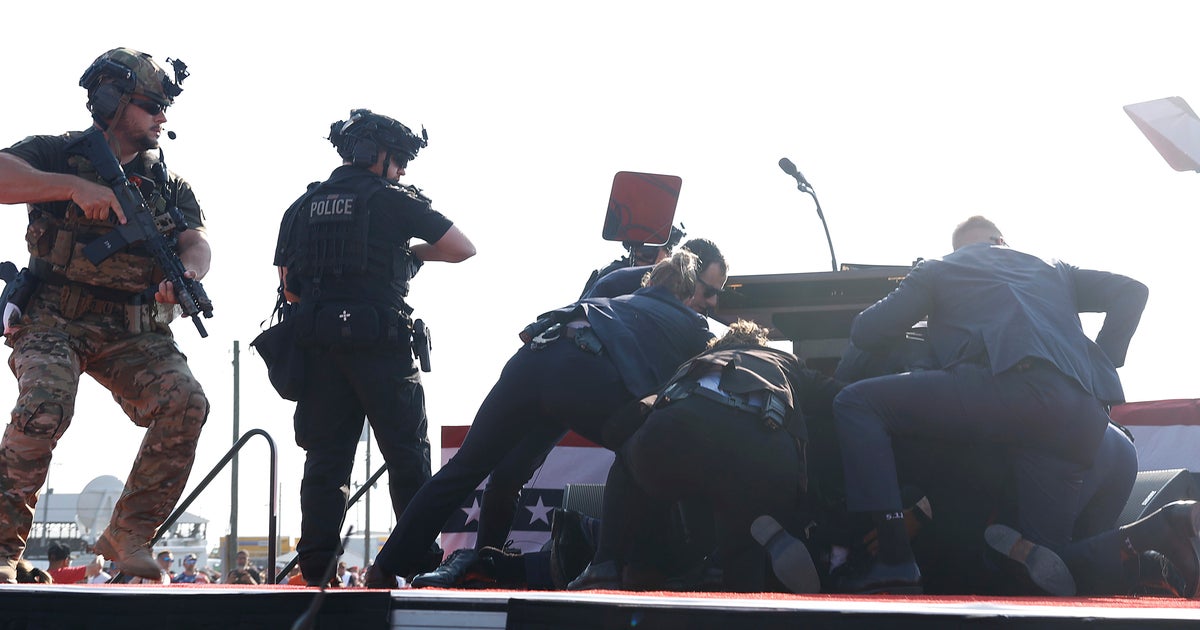
WASHINGTON, D.C. (KDKA) — The House task force investigating the July 13 assassination attempt on President-elect Donald Trump issued subpoenas on Monday to the Bureau of Alcohol, Tobacco, Firearms and Explosives for testimony from two ATF employees regarding the response to the Butler, Pennsylvania, shooting.
The subpoenas follow letters from the task force’s chairman, Rep. Mike Kelly, Republican of Pennsylvania, and Ranking Member Jason Crow, Democrat of Colorado, seeking documents and testimony on Oct. 3 and Nov. 6.
A shooter opened fire at Trump’s July 13th rally in Butler, wounding Trump when a bullet grazed his ear. A rally-goer was killed and two others were wounded before Secret Service snipers shot and killed the gunman, later identified as a 20-year-old Pennsylvania man. Since then, Trump won the presidential election and will be headed to the White House in January.
In a release from Kelly’s office, the task force said the ATF had not produced any requested documents or made any personnel available for interviews with the task force, and the ATF made its first set of documents available less than an hour after served the subpoenas for depositions.
One of the two subpoenas for depositions was issued to an agent who participated in the agency’s response to the shooting in Butler, the release said. The other is for testimony from a supervisory agent, according to the media release.
Excerpts from Kelly’s letters to the two ATF employees stated that the task force “specifically outlined seventeen requests for document production, even going so far as to note which were the priority items. In addition, the Task Force identified three categories of requests for transcribed interviews with relevant ATF agents.”
The bipartisan House task force said last month that the incident was “preventable,” detailing in a report that there were communication and planning shortcomings.


